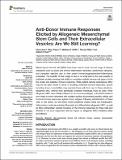| dc.contributor.author | Lohan, Paul | |
| dc.contributor.author | Treacy, Oliver | |
| dc.contributor.author | Griffin, Matthew D. | |
| dc.contributor.author | Ritter, Thomas | |
| dc.contributor.author | Ryan, Aideen E. | |
| dc.date.accessioned | 2018-01-10T09:52:50Z | |
| dc.date.available | 2018-01-10T09:52:50Z | |
| dc.date.issued | 2017-11-24 | |
| dc.identifier.citation | Lohan, Paul, Treacy, Oliver, Griffin, Matthew D., Ritter, Thomas, & Ryan, Aideen E. (2017). Anti-Donor Immune Responses Elicited by Allogeneic Mesenchymal Stem Cells and Their Extracellular Vesicles: Are We Still Learning? Frontiers in Immunology, 8(1626). doi: 10.3389/fimmu.2017.01626 | en_IE |
| dc.identifier.issn | 1664-3224 | |
| dc.identifier.uri | http://hdl.handle.net/10379/7086 | |
| dc.description.abstract | Mesenchymal stromal cells (MSC) have been used to treat a broad range of disease indications such as acute and chronic inflammatory disorders, autoimmune diseases, and transplant rejection due to their potent immunosuppressive/anti-inflammatory properties. The breadth of their usage is due in no small part to the vast quantity of published studies showing their ability to modulate multiple immune cell types of both the innate and adaptive immune response. While patient-derived (autologous) MSC may be the safer choice in terms of avoiding unwanted immune responses, factors including donor comorbidities may preclude these cells from use. In these situations, allogeneic MSC derived from genetically unrelated individuals must be used. While allogeneic MSC were initially believed to be immune-privileged, substantial evidence now exists to prove otherwise with multiple studies documenting specific cellular and humoral immune responses against donor antigens following administration of these cells. In this article, we will review recent published studies using non-manipulated, inflammatory molecule-activated (licensed) and differentiated allogeneic MSC, as well as MSC extracellular vesicles focusing on the immune responses to these cells and whether or not such responses have an impact on allogeneic MSC-mediated safety and efficacy. | en_IE |
| dc.description.sponsorship | OT and TR are supported by a Science Foundation Ireland grants (12/IA/1624), PL, MG, and TR are supported by EU FP7 [Collaborative Health Project VISICORT (grant number 602470)], Science Foundation Ireland [REMEDI Strategic Research Cluster (grant number 09/SRC-B1794); MG is supported by CÚRAM Research Centre (grant number 13/RC/2073)]; the European Commission [Horizon 2020 Collaborative Health Project NEPHSTROM (grant number 634086), and the European Regional Development Fund. AR is supported by Irish Cancer Society Fellowship (CRF12RYA) and Science Foundation Ireland Starting Investigator Grant (15/SIRG/3456). | en_IE |
| dc.format | application/pdf | en_IE |
| dc.language.iso | en | en_IE |
| dc.publisher | Frontiers Media | en_IE |
| dc.relation.ispartof | Frontiers In Immunology | en |
| dc.rights | Attribution-NonCommercial-NoDerivs 3.0 Ireland | |
| dc.rights.uri | https://creativecommons.org/licenses/by-nc-nd/3.0/ie/ | |
| dc.subject | MARROW STROMAL CELLS | en_IE |
| dc.subject | BONE-MARROW | en_IE |
| dc.subject | IMMUNOLOGICAL-PROPERTIES | en_IE |
| dc.subject | DOSE-ESCALATION | en_IE |
| dc.subject | PRECURSOR CELLS | en_IE |
| dc.subject | CROHNS-DISEASE | en_IE |
| dc.subject | IN-VITRO | en_IE |
| dc.subject | IMMUNOGENICITY | en_IE |
| dc.subject | DIFFERENTIATION | en_IE |
| dc.subject | REJECTION | en_IE |
| dc.title | Anti-donor immune responses elicited by allogeneic mesenchymal stem cells and their extracellular vesicles: Are we still learning? | en_IE |
| dc.type | Article | en_IE |
| dc.date.updated | 2018-01-02T14:18:37Z | |
| dc.identifier.doi | 10.3389/fimmu.2017.01626 | |
| dc.local.publishedsource | https://doi.org/10.3389/fimmu.2017.01626 | en_IE |
| dc.description.peer-reviewed | peer-reviewed | |
| dc.internal.rssid | 13680915 | |
| dc.local.contact | Thomas Ritter, School Of Medicine, Regenerative Medicine Institute, Biosciences, Dangan. 5329 Email: thomas.ritter@nuigalway.ie | |
| dc.local.copyrightchecked | No its open access | |
| dc.local.version | PUBLISHED | |
| nui.item.downloads | 351 | |


